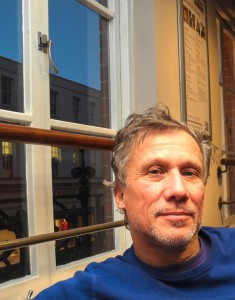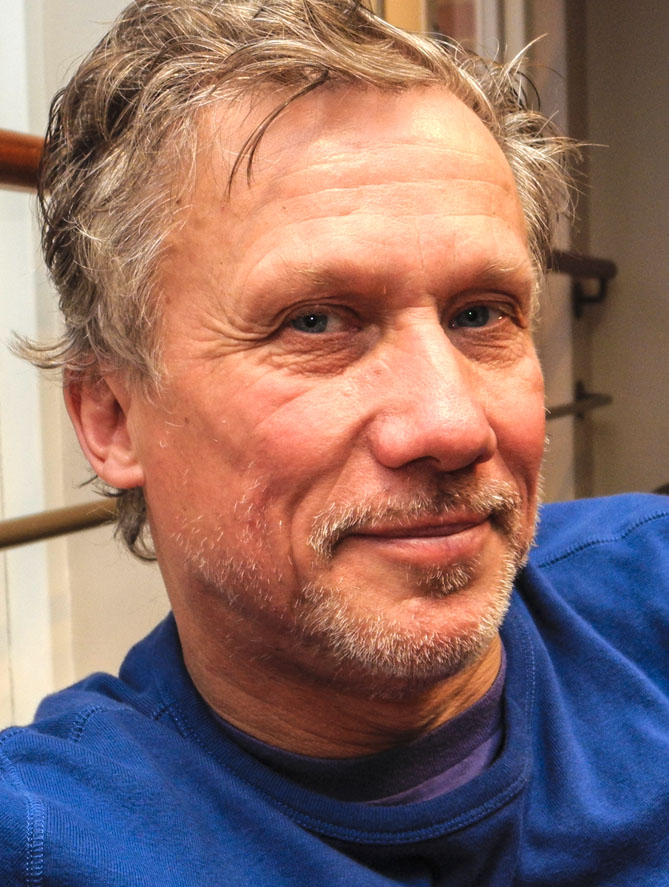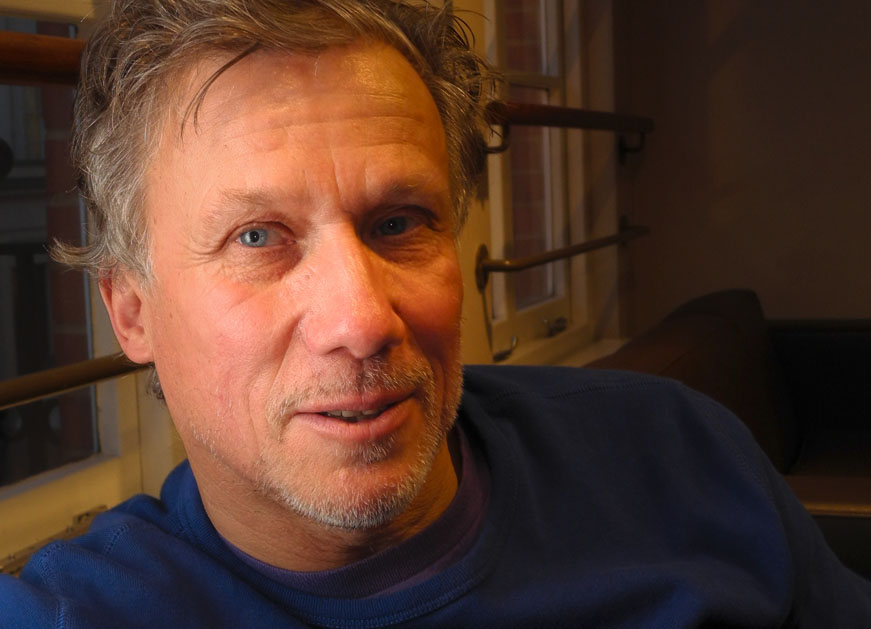Peter Duncan has been acting since he was fifteen and has been a familiar face on our screens for the past thirty-five years. His parents wrote and produced pantomimes so was it inevitable that he would go into the business?
‘I went to Italia Conti stage school, but not very much because soon after I started, I left school at fifteen. I got some work playing Jim Hawkins in Treasure Island and then I got a job at the National and I was there for two years. I was going to Contis at the same time but if you saw my reports most of them said, “Where was he? He only attended one class last term.” All the teachers were really pissed off because I was working and they weren’t. I was at Olivier’s National Theatre for two years so that, mixed in with Conti’s was my training. You couldn’t train anywhere better than that really.’
You have always done lots of different things, from doing travel programmes to being Chief Scout to writing and directing pantomimes. So how did Birdsong come about?
‘I was just a hired hand. They were looking for a new Jack Firebrace after they toured it last year and I was just an actor on a list really. I was interviewed and they offered it the next day.’
Were you already familiar with the story? ‘I suppose I was aware, from the book, that my character Jack was really the heart of it and I remember watching the TV adaptation and thinking it was one of those parts that sort of clicks emotionally. In the play he has a clear narrative throughout and what goes on in his life is accessible and helps the characterisation of it.
‘But I didn’t read the book again, prior to rehearsals, because I thought it best to treat the play as the source and actually, when we got there, the director said don’t worry about not reading the book. Some of the things that were in the book that we had in the play when we started, have gone; it was a continual process of development.’
 Did you do much research in preparation? ‘I watched some of the Jeremy Paxman series on the First World War but that’s less about the actual fighting and more about the social context of it and how it affected those at home. I liked all that about the anarchists and pacifists; it’s an angle you are not normally aware of. There were arguments that perhaps it wasn’t necessary to go to war and that life was perhaps seen as cheap. But when you were in it, you were in it and you had to pick a side I suppose. And all that about the deal between Emily Pankhurst and Lloyd George, him promising to give women the vote if they made the shells.’
Did you do much research in preparation? ‘I watched some of the Jeremy Paxman series on the First World War but that’s less about the actual fighting and more about the social context of it and how it affected those at home. I liked all that about the anarchists and pacifists; it’s an angle you are not normally aware of. There were arguments that perhaps it wasn’t necessary to go to war and that life was perhaps seen as cheap. But when you were in it, you were in it and you had to pick a side I suppose. And all that about the deal between Emily Pankhurst and Lloyd George, him promising to give women the vote if they made the shells.’
Our generation has been very lucky in that we have never been directly involved with a war. Are you conscious of that? ‘As I’ve got older I always thought how lucky we were that nothing has happened to create that level of sadness or destruction. Wars are still thrust on us but we don’t have that direct contact. With conflicts like Syria it’s still troubling and you still sense a meanness in the country. There is a politician’s meanness where people could be more generous. Any life matters, not just in your own country. I guess the pacifist argument is that it should have all been sorted out before the fighting started.’
But pacifists never make it clear what they would do if an enemy soldier was marching up their garden path with fixed bayonet about to murder their wife and children. ‘I agree the belief would be challenged if your family’s, or more importantly your children’s lives were directly threatened. There was a bit in the Paxman programme about some conscientious objectors who were imprisoned in some old castle dungeon. Clearly it was their religious faith that motivated them; they were sticking to the idea of thou shall not kill. They didn’t seem to be cowards. If everyone in England had known the level of carnage that would occur at Passchendaele or the Somme perhaps they would have said no.
‘There was the sinking of the Lusitania and the political and media manipulation whipped up this frenzy where every able-bodied man, and lots of youths, couldn’t wait to sign up. There is a lot more cynicism and awareness of all that stuff now and I think it does make a difference. Maybe it would be harder now to persuade people to go to war.’
But your character, Jack, is substantially changed by his experiences both on the front and events back in England. ‘It’s interesting in Birdsong, especially with the part I play, that he starts off with all the right characteristics. Maybe he is idealistic but in the end his heart is broken by events at home and he gives up on the one strand of faith where he thought there might be some fairness. But there isn’t.’
But isn’t Jack a bit too good to be true, putting everyone else’s loss and suffering before his own? ‘There are people like that who feel alive because of that, not for the gratification. It’s a sense of duty, of responsibility to others. Jack is almost the father figure being a lot older than most of the soldiers.’
How did you go about preparing for the play? Did you delve into the character’s back-stories? ‘I suppose the main source was remembering the book and imagining the smells and the textures, the physicality of it. We needed to get a real sense of what it would be like to dig through deep clay. The company was a very mixed bunch of people, much the same as you would get in the trenches. It is very much an ensemble piece and we all reached the same point by different means.
‘What is great about this company is that it is in many ways an old-school theatre company because Alistair [Whatley] is in a sense the producer and director and he appears in it. But it is, in a way, like an actor lead company. He had a very strong visual image, he was very accurate about shapes. You pick up things. My wife was reading the book and pointed out that it mentioned that Jack had a centre parting in his hair, so I thought, okay, I’ll try that. It’s a gradual building. I pitched him as South London, where I come from, more sort of suburbs that East End. But you use things, like imagining your own children’s demise, as a trigger.’
You were brought up in South London, did you know people like Jack? ‘I didn’t model Jack on anyone, I modelled him on a version of my own spirit. But you have to put it in the context of a hundred years ago. People then were much more wanting and believing in a God. Your behaviour on Earth dictated what would happen afterwards and I think maybe someone like Jack thinks that if he behaves correctly nothing bad will happen to him or his loved ones. When he is defeated in that belief he changes, but it’s too late.
‘The captain in the play has a line about children’s need to believe in something beyond themselves, as many adults do. You can be cynical about faith but it doesn’t half bind people together emotionally. All armies claim they have God on their side, even though it maybe a different god.’
The Jeremy Paxman series looked at the war from a different angle. Did you find that enlightening? ‘One of the things I learned from the Paxman programme was that nobody expected the war to pan out like it did, everybody was saying it’ll all be over by Christmas. They all seemed to believe in the romantic notion of an officer with a sword leading a cavalry charge. Like in the play, the officer has his sword out before going over the top. It was the ridiculous notion that you can charge through a hail of machine gun bullets and win.
‘It’s all extraordinary stuff really. It is impossible for our generation to imagine. But Birdsong gives you an emotional journey whereby you are drawn in and you feel you are learning as much about the emotional carnage as the physical carnage.’
Peter Duncan was talking exclusively to Michael Hasted on 20th February 2014
Text and photos © Michael Hasted 2014. All rights reserved. No reproduction in part or whole without express prior agreement.
Click here to read our review of Birdsong



